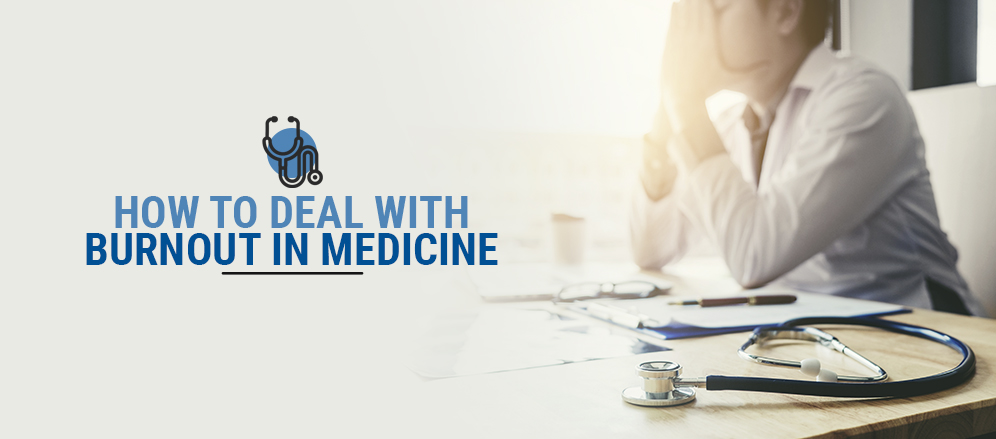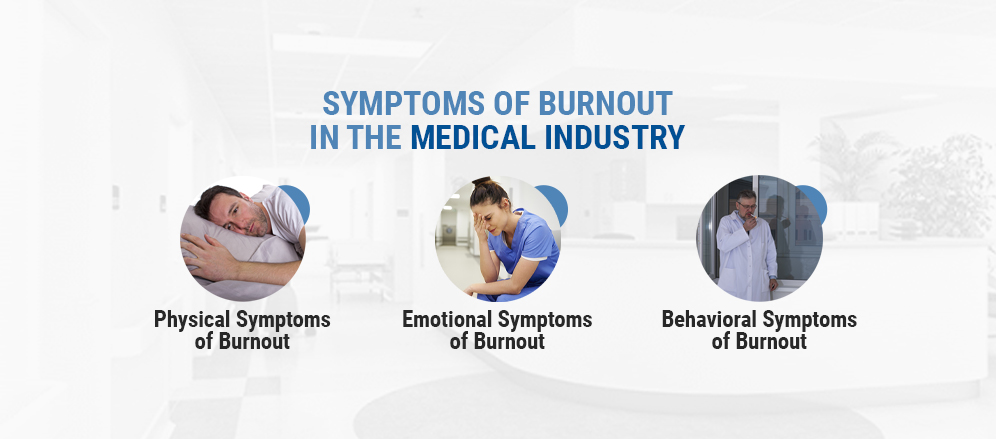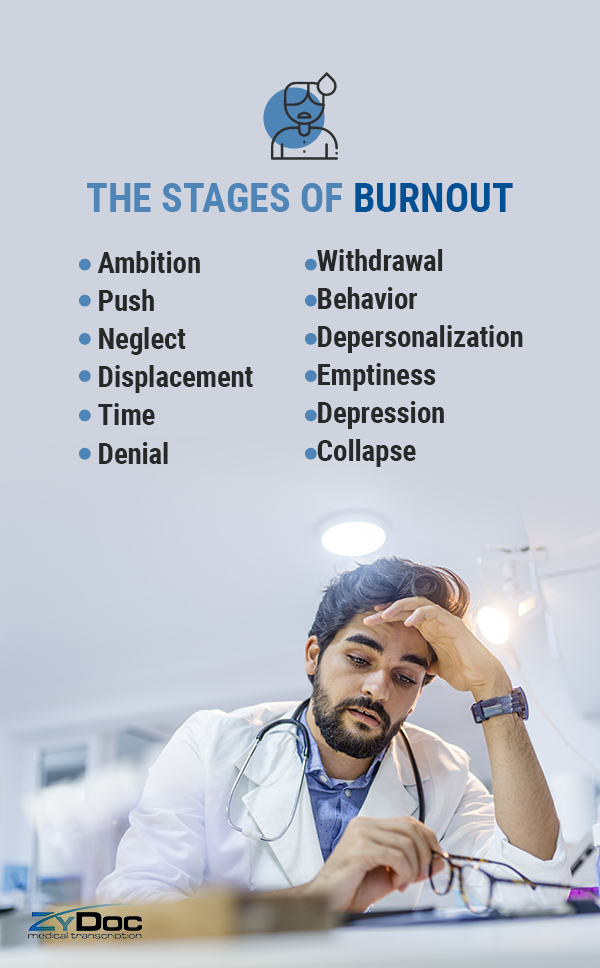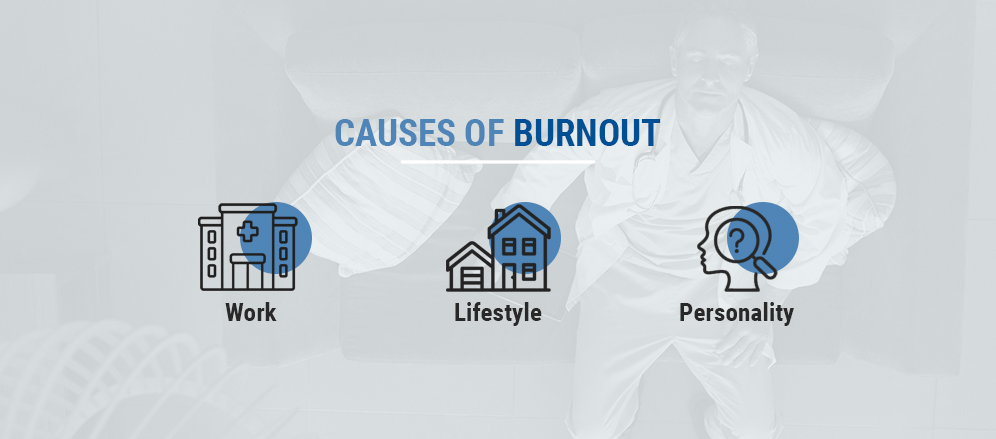How to Deal With Burnout in Medicine
Sep 29, 2020 | Jonathan Maisel
Burnout is a common occurrence in jobs designed to help others, such as medicine and emergency services. Those who work in the healthcare industry are even more likely to experience burnout for several reasons, including the stress of the job itself, the need to keep pushing to do better and the lack of a proper balance between work and personal life.
Though it’s often caused by excessive and prolonged stress, burnout is not synonymous with stress. Unlike stress, which usually comes with a glimmer of hope that things will improve, burnout makes a person feel like there is no way out of their situation.
It causes physical, emotional and behavioral distress and can lead to errors in medical care, lower quality of care and even patient dissatisfaction. Healthcare professionals suffering from burnout are more likely to indulge in self-medication with alcohol, fall into depression and attempt or succeed at suicide.
In the United States, one study found that physicians were more likely to experience burnout than any other type of worker in the country. More than half of American physicians and nurses experience burnout or symptoms of it. Physicians who work in emergency services, general internal medicine and family medicine are at a higher risk, but every aspect of healthcare comes with its own set of stressors. That means nurses, physician assistants (PAs) and clinicians are as likely to experience burnout as physicians.
As with most things, prevention is easier than finding a cure, but how do you identify burnout in yourself, a co-worker or a loved one? The first step is understanding what it looks like.

Symptoms of Burnout in the Medical Industry
Because every medical profession has varied sets of responsibilities and experiences, their associated stressors can also be different. However, burnout symptoms are often very similar and boil down to someone acting unlike they usually do. This phenomenon can be as subtle as a co-worker quietly isolating themselves or as noticeable as them constantly calling in sick.
Burnout presents itself physically, emotionally and behaviorally, so it’s crucial to know what to look for.
Physical Symptoms of Burnout
There’s no right or wrong way to experience healthcare burnout. Some people may only experience a few physical symptoms, while others may endure more of them. The most common signs of burnout include:
- Increased fatigue.
- Frequent illness.
- Increased headaches, back pain or muscle aches.
- Disrupted sleep — either sleeping too much or not enough.
- Changes in appetite.
Emotional Symptoms of Burnout
The emotional symptoms of healthcare burnout can be a little more nuanced, depending on the medical field. For example, paramedics may not express emotional symptoms as much as other medical professionals because they believe they need to stay strong or have a thick skin. Nurse burnout will more likely include compassion fatigue, which involves feeling cynical about the work and patients.
Some common emotional symptoms of burnout include:
- Feeling like a failure at your job or doubting your professional abilities.
- Feeling helpless about, trapped in or defeated by your work situation.
- Feeling isolated and detached, as if no one could empathize.
- Feeling unmotivated about the job.
- Feeling less satisfied or accomplished in your work.
- Being unable to look at things positively or with hope.
Behavioral Symptoms of Burnout
Like the emotional signs of healthcare burnout, the behavioral symptoms may vary from specialty to specialty. The most common ones include:
- Avoiding work responsibilities.
- Isolating yourself from friends, family and co-workers.
- Procrastinating in your personal and professional life.
- Using food, drugs or alcohol as a coping mechanism.
- Misdirecting your frustration onto the people around you.
- Frequently skipping work, being late or leaving early.

The Stages of Burnout
Burnout does not occur in one fell swoop. It consists of many different components that keep adding up until you’re unable to carry the burden any longer. Psychologists established the 12 stages of burnout to help people better identify the warning signs.
The 12 stages are as follows:
- Ambition: Having goals is great, but unrealistic objectives and an excessive drive to succeed can lead you to burnout. This issue is especially common for people who are starting a new job or beginning a special task at work and are determined to prove themselves worthy.
- Push: With ambition comes the attitude that you must succeed, leading you to push yourself — sometimes beyond your abilities.
- Neglect: With your goal in sight and your motivation high, you can end up with tunnel vision, leading you to ignore your well-being by skipping exercise, sleeping less and eating unhealthily.
- Displacement: You’re only human and, by now, your body and life will start feeling the pressure you’ve been putting on it. But instead of stopping to consider that you may be the one pushing yourself, you displace your anger and blame others for your troubles.
- Time: You begin pulling away from friends and family to focus on work.
- Denial: The frustration from stage four is growing stronger, but you’re still unable or unwilling to acknowledge reality. Instead, you begin blaming others for your behavior and become increasingly impatient with them.
- Withdrawal: You begin to isolate yourself further, moving away from your friends and family and declining all social invitations.
- Behavior: As you struggle to keep functioning as normal, you’ll find your behavior changing for the worse, with aggression and irritation becoming more common.
- Depersonalization: You feel overwhelmed — like you’re losing the ability to control your life.
- Emptiness: You may feel apathetic or trapped, causing you to indulge in risky or thrill-seeking activities — like substance use or overeating — to cope.
- Depression: You believe there’s no hope anymore — no light at the end of the tunnel.
- Collapse: You’ve reached the end of your rope and can no longer cope at all. At this point, medical attention may be necessary.
Even though the stages are listed linearly, they may not occur this way — or even chronologically. Some people may only experience some of these, while others may experience multiple stages simultaneously.

Causes of Burnout
Burnout is usually caused by prolonged excessive stress, but stress doesn’t just happen all of a sudden. Therefore, the exact source of burnout varies from person to person. The medical field is vast and consists of numerous professions, and each comes with unique stressors. However, the general catalysts for burnout within medicine are very similar and can fit into three categories:
- Work
- Lifestyle
- Personality
In addition to those is the concept of a proper work-life balance. Your personal and professional lives should exist in harmony. If you ignore your professional life in favor of your home life, your work will suffer. Similarly, if you neglect your personal or social life to focus on your work, you risk burning yourself out.
It can be a challenge to find that perfect balance of work and life, especially when you allow yourself to believe that work is inherently more important than your social life.
Work
A study found that work conditions were among the top causes of why physicians felt stressed. Some factors included things like time pressures and dysfunctional work dynamics or corporate disorganization.
Many medical professionals feel stressed by the time constraints of their occupation. Whether it’s paramedics who need to respond to emergencies quickly or family doctors who feel they aren’t allotted enough time with patients, time plays a big role in work stress. It leads to the feeling of having no control — whether it’s appointments, emergencies, workloads or resources — which can lead to burnout.
Now add the feeling that your work isn’t recognized or appreciated, exceedingly overwhelming responsibilities — such as emergency-room duties — or chaotic or high-pressure environments. With those combined, you’ve got a recipe for burnout.
Your colleagues can also affect you, especially if you feel bullied or otherwise harassed in your workplace. An overbearing supervisor, a flakey intern or a constantly absent colleague can all add to work stress, which can snowball into a bigger problem.
Lifestyle
Lack of sleep, refusal to seek help when your plate is too full and a work-over-everything-else mindset are just a few lifestyle choices that guide you to burnout. Even with a monotonous or repetitive job, investing all your time and energy into it can lead to burnout. That’s especially true if you lack any kind of support from friends or family, which can make you feel even more isolated.
Personality
Unfortunately, some of us are born with personality traits that make us prone to certain conditions. People with perfectionist tendencies who are extremely high achievers and need to be in control of everything are more likely to fall victim to burnout.
People with a cynical view of the world can also end up being unwilling or unable to delegate tasks. They may opt to do everything themselves because they don’t trust that others will do a good enough job.
How to Deal With and Prevent Burnout
Because this type of exhaustion is not a rare occurrence, medical burnout tips are in abundance. However, preventing the issue is often easier than curing it. The three Rs for preventing burnout — recognize, reverse and redo — tend to be the formula many people cite. It’s a quick and simple way to step back and examine your situation. Here’s how it works:
- Recognize: Understanding burnout and realizing you’re not exempt from it is the first step to recognizing it. After all, you cannot find a solution to a problem if you refuse to acknowledge it exists.
- Reverse: When you recognize you’re heading down a dangerous path, stop and reevaluate the situation with the support of loved ones. Reverse the damage by prioritizing your well-being and practicing stress management.
- Redo: Burnout signals that something is wrong. Reevaluating what your goals are or how to achieve them may be necessary. Take stock of your life and consider what’s truly a priority for you. Then, work to establish and maintain a proper work-life balance.
Sometimes, you can get so wrapped up in work that you fail to recognize the signs of burnout. If you end up experiencing burnout, know that it’s not the end of the world. It is, however, a plea from your body for compassion and mercy. If you’re already experiencing burnout, here are some medical burnout tools to help you get through it:
- Get support: Asking for help isn’t a sign of weakness — it’s an act of strength to recognize when you’re in over your head. Reach out to friends, family or co-workers and blow off some steam. Avoid interacting with people who bring you down or stress you out. Even something as simple as switching to electronic health records (EHR) can take a burden off you and allow you to relax.
- Change outlook: The healthcare industry can be extremely stressful, but one of the best medical burnout tips is to readjust your view of your job. Trying to find the good in it is one way, but allowing yourself some time off to rest is also beneficial. Get to know your co-workers better and establish a suitable work-life balance, so work doesn’t seem like a chore or burden.
- Reevaluate priorities: A great nurse burnout tip is to set boundaries and learn to say no. Nurses are often expected to go above and beyond their job requirements, but to be a good nurse, you need to be healthy, and burning out is the opposite of that. Nurses and other healthcare professionals can beat burnout by finding other things to occupy their time and mind. Adopting a hobby or trying other relaxation methods are a few nurse burnout tools to consider.
- Prioritize health: Sleeping properly and engaging in physical activity are crucial to your mental and physical well-being. Exercise is a great way to beat stress. One study showed that it’s one of the better ways to beat burnout. As little as 30 minutes a day can do wonders — and it doesn’t even need to be 30 consecutive minutes. Two 15-minute walks a day can be an antidote to stress.
- Eat well: Food plays a big role in our physical and mental well-being. One symptom of burnout is overeating, which can make you feel worse — both physically and mentally. Establish and maintain a balanced diet that’s low in sugar and carbs, and cut down on the nicotine and alcohol.
There’s no medical treatment for burnout, per se, but managing it requires a change in habits and a mental shift — plus a little creativity. Preventing or beating burnout doesn’t have to consist of major changes that rearrange your life. Small things like delegating some of your work to ease your burden and redistributing responsibilities can improve the overall morale of your workplace and staff.
Prevent Burnout By Using Electronic Health Records With ZyDoc
Burnout is more than a minor inconvenience — it can lead to crucial errors and cause harm. Healthcare workers owe it to their patients — and especially to themselves — to ensure their jobs are stress-free. That’s why ZyDoc offers cutting-edge technology to help you ease the burden of medical documentation. Our services are designed by our CEO — a medical doctor who understands the dangers of burnout — and are 100% HIPAA-compliant.
Transcribing your EHR instead of typing everything yourself is one way to remove stress and free up more of your time. With a more efficient workplace, you can reduce your chances of dealing with burnout. We offer competitive prices, transcriptionists who are well-versed in medical jargon and various pricing options to suit your needs. Get in touch to start your free trial by calling 1-800-546-5633.
